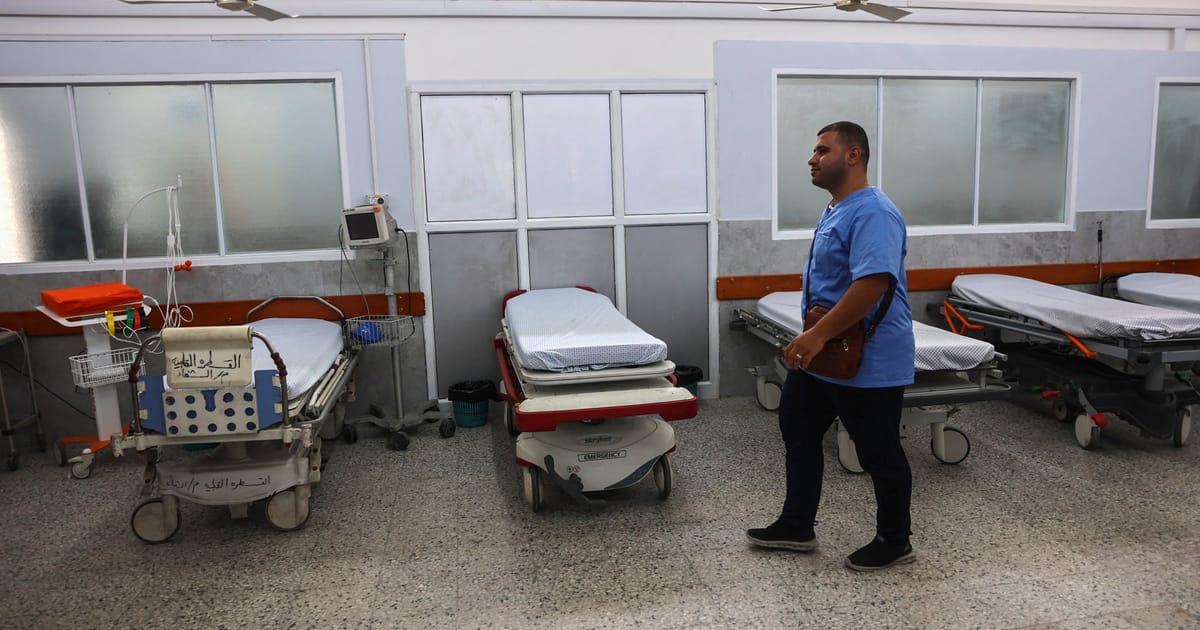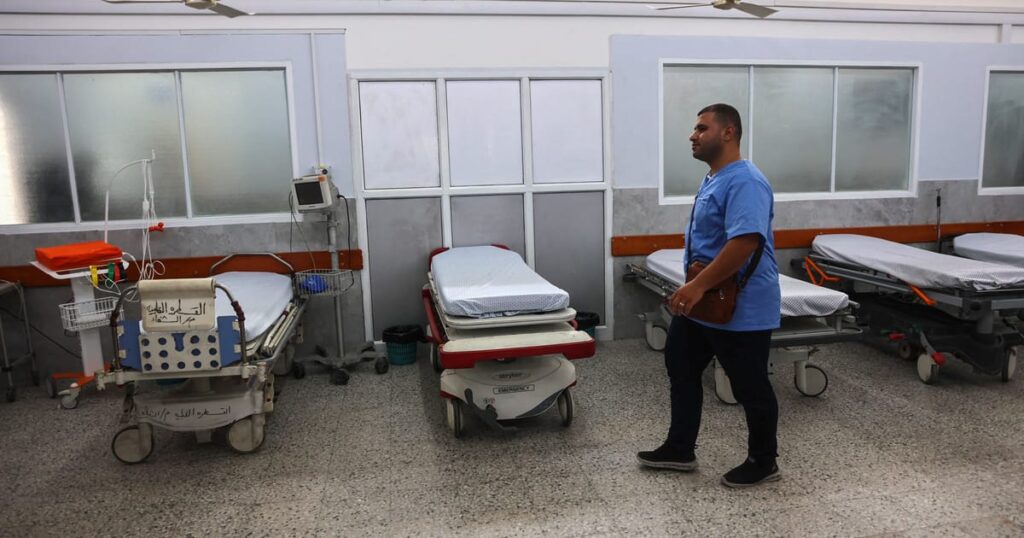
Michael Barry is an anesthetist and intensive care doctor. Suhail Khan is an orthopedic surgeon. Edward Brown is a consultant vascular and general surgeon. He recently returned from volunteering in one of the medical aid for Palestinians emergency medical teams in Gaza.
Three loud bangs, followed by the wail of ambulance sirens.
Israeli military-designated “safe zones” sheltering internally displaced people have been hit. And in the next half hour, the emergency room will be full of burned, disoriented and passed out patients, many of them children — just like last time and times before.
All we can do is prepare in anticipation. We know we will soon be overwhelmed. Many hospitals here cannot deal with the sudden influx of hundreds of blast-injured patients, especially when they continue to be without medical supplies as they are.
In the midst of the chaos, one of our local anesthetist colleagues hears that his cousin and neighbor have been killed in the latest airstrikes, which have hit hundreds of people sheltering in a derelict school. He continues to work, his wife and sons are relieved unharmed. He only later recognizes that his cousin was sleeping in the operating theatre, having died during surgery; His body was too limp to be recognized at first.
Another of his cousins has been killed in a subsequent airstrike on the Al Mawassi humanitarian “safe zone”, two days after being ordered to evacuate by Israeli forces. Shortly after, another airstrike hit the house next door, destroying valuables and a mobile phone – his only means of communication, bought at a very high price. And two days later, the latest attack on Khan Yunis forces him to evacuate himself. He has nowhere to go.
It is constant.
Much has been written about Gaza in recent months – often technical, sometimes passionate, articles describing the widespread destruction of infrastructure and health care facilities, the famine, the horrors of war. And while the resilience of the Palestinian people is widely respected and admired, what we see is a deeply traumatized and exhausted population. People are often displaced, homeless, chased around destroyed slips of land where no place is truly safe.
What we see in Gaza is a triangle of death: drought, dehydration and disease, with the emergence of infectious epidemics – such as hepatitis A and now polio – due to poor sanitation conditions and lack of vaccinations for children.
Many of our Palestinian colleagues lost family members during the bombings, only to briefly stop their work to acknowledge the loss. Most still come to work without being paid for months; Some people don’t even stop to leave the hospital, while their families struggle to survive in oppressive heat and humidity, in dilapidated buildings or tents without sanitation.
This, along with the constant fear surrounding safety, and the need to organize food, water and firewood, is pushing many to the brink. These health care workers, along with 2 million other Palestinians, need help, and they need it urgently.
The laws governing war are devoid of emotion but are intended to preserve a degree of humanity—even in conflict. We are doctors, not lawyers, but the legal principle of proportionality appears absent in these latest attacks. And proportionality is important in determining the legality of an act of war. Killing 100 civilians and injuring hundreds more to take out a suspected Hamas operative seems excessive compared to the military gain, and it gives some indication of the value attributed to Palestinian life by the Israeli military.
The warring parties differ fundamentally in their perspectives, and we do not intend to take sides. However, it is beyond doubt that the civilian population of Gaza is trapped and subject to extraordinary, inhumane suffering. It is also beyond doubt that most of the injured parties are civilians – women and children. Soon, we all saw a lot of broken, burnt, mutilated bodies; destroyed families; disabled and orphaned children; Dispersed futures. While war may quench the thirst for revenge for Israel, or fuel the fires of resistance for Hamas, it will not provide security for either side. All the while, the population of Gaza is moving from genocide to genocide with no end in sight.
The health care system in the Gaza Strip has collapsed and is in free fall. There is a lack of consumables, drugs and equipment needed to be able to treat multiple mass casualties as well as simple medical problems that are actually treatable. For example, many patients admitted to the intensive therapy unit were comatose due to lack of insulin to treat their diabetes.
Moreover, in violation of international humanitarian law, several senior physicians have been abducted by the Israeli military, holding them in inhumane conditions for months. The staff left behind are often junior physicians and medical student volunteers.
Looking into the future seems almost impossible here. The reconstruction effort required for a site reduced to rubble would be enormous. So, too, will the health care needs: many survivors will need multiple specialist surgeries to treat complex organ injuries and burns; Amputees will need physiotherapy and prosthetics. The day-to-day health system – including primary care – will need to be rebuilt from scratch; And the mental health burden, often overlooked in acute conflict, is huge, with many reported symptoms of post-traumatic stress disorder, complicated grief and depression.
Who – and how – will address the extensive health care needs of this beleaguered population cut off from the rest of the world is uncertain.
Our first seizure patient arrives on his deathbed, part of his left leg held alone by skin and tendons, before being given anesthetic he whispers: ” I’m tired. I have had enough of war. Please let me die.”
We urge the international and medical community to demand an immediate and permanent ceasefire and allow access of much-needed humanitarian aid to Gaza.
Post From hospital in Gaza: ‘Please let me die’ appeared first Politico.
